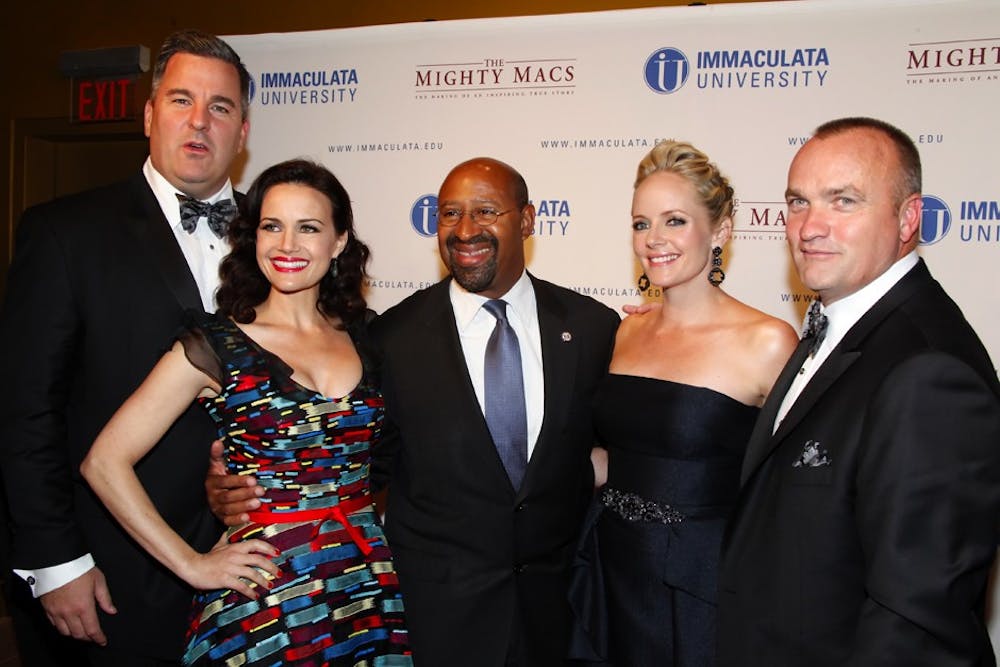Philadelphia is known for its illustrious basketball history. Home to the Big 5, the Palestra has hosted more college basketball games than any other arena in the country. The Philadelphia Warriors won the inaugural NBA Finals in 1947.
But few people are aware that Philadelphia can also be considered the birthplace of modern day women’s college basketball.
Long before Connecticut and Tennessee emerged as national powerhouses, it was Immaculata University that was the first dynasty. A small Catholic college just 20 miles outside the city, Immaculata was the unlikely winner of the first three national championships in women’s basketball from 1972-1974.
The Mighty Macs, a film written, produced and directed by 1985 College graduate Tim Chambers, tells the tale of the first of those championship teams which brought both Immaculata and women’s basketball itself to the national scene.
“The story itself is really the Cathy Rush story,” said Chamber, a cornerback for Penn football in the 1980s. “It’s told through her point of view and it’s her recollection of the championship years.”
Rush, played by Carla Gugino, compiled a 149-15 record coaching the Mighty Macs from 1972-1977. In 2008, she was inducted into the Naismith Memorial Basketball Hall of Fame in a class that included Patrick Ewing, Hakeem Olajuwon and Dick Vitale.
“People credit her as the mother of modern day women’s basketball — the way she changed the game,” Chambers said.
1972 marked the first year that college women played by men’s rules. Prior to then, girls played with six players on a side. Two guards remained in the backcourt to play defense, and two forwards stayed in the frontcourt for offense. Only the two “rovers” were allowed to cross halfcourt.
The movie also showcases the transition of women’s sports in the 1970s, prior to the effects of Title IX on college sports.
“You look at the Immaculata uniforms alone — in 1972, they were playing in tunics,” Chambers explained. “But by 1974, they were actually in basketball uniforms like the ones we see today.”
Chambers’ experience with the Mighty Macs basketball team goes back to when he was an elementary school student at St. Anastasia School in Newtown Square, Pa.
The gym at Immaculata burned down prior to the start of the 1972 season, and the team chose to practice at nearby St. Anastasia.
“I remember them coming in to practice and really just how talented they were,” Chambers recalled. “You knew that you were seeing something for the first time.”
So years later, when the school first approached Chambers with the opportunity to make the movie, he jumped at the chance.
“For me it was always personal, because I did have knowledge of the story and I went to Catholic school for 12 years.”
But Chambers didn’t take on the project alone. His partner at Quaker Media, Inc., Vince Curran joined him as an executive producer for the film. Curran is a former Penn basketball player and current radio announcer for the team.
Chambers and Curran had to jump through a series of hoops before the movie made it to the big screen.
Before the two were even granted the rights to make the movie, they had to agree to give the university, specifically the religious order, final approval of the script.
They faced another obstacle when the cast was first selected. Katie Hayek, who plays the major role as a player in the film, was diagnosed with cancer the same day she was selected for her part.
Chambers knew he wanted Hayek for the role — she was both a theatre major and basketball player at the University of Miami — but he didn’t know if it would be possible.
“In a lot of ways, the director is like the head coach, where you just have to go with your instincts,” Chambers said. “I sat down with her and her dad and talked about how much the movie meant to her.”
In order to make it work, he arranged the shooting schedule so that all the basketball scenes requiring physical activity were shot first, before Hayek became too taxed from her chemotherapy treatment.
“She’s phenomenal in the movie,” Chambers said. “It was unconventional, but in the end, we felt like she was the right person and I’m glad we did what we did.”
Though the process took seven years from start to finish, both Chambers and Curran believe their effort was worth it.
Chambers called the reaction among women “overwhelming.”
“The fact that we have had so many group sales and private screenings for women’s basketball teams throughout the country [shows that].”
For Curran, the movie had extra meaning since he has a young daughter.
“I wanted this film to be there for her. I wanted it to show that she is allowed to dream and she can do whatever she wants and it wasn’t always this way,” he said.
“If my involvement in this film gives her even a little more inspiration, then I will have done my job as a father just a little bit more.”



